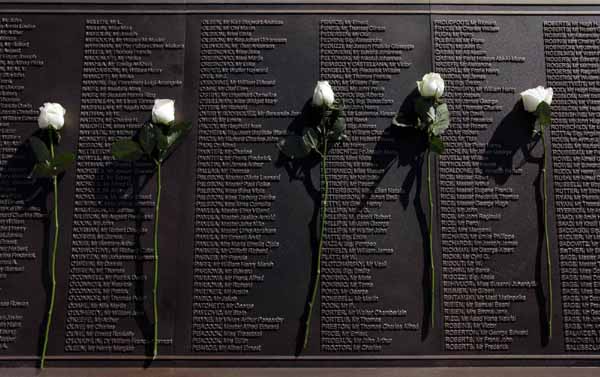
LONDON - Sunday marks the 100th anniversary of perhaps the most famous sea disaster in history. The occasion was being commemorated at a museum in the Northern Irish city of Belfast.
The Titanic Belfast Museum is the world's largest Titanic museum, and it is built in the dockyard area where Titanic and its sister ship Olympic were built 100 years ago.
The museum, which opened for the first time at the end of last month, resembles the bows of several 30-meter tall passenger liners.
 |
|
Roses rest on a plaque bearing the names of those who died when the Titanic sank, at the unveiling of the Titanic Memorial Garden in Belfast's City Hall April 15, 2012.[Photo/Agencies] |
Niall Gibbons, chief executive of Tourism Ireland, told Xinhua, "The Titanic is an iconic story around the world brought to life in many films and books and stories."
"There were an enormous number of stories associated with the Titanic; it became the subject of inquiries, it became the subject of films. And after the discovery of the wreckage site in the 1980s it unleashed a whole new wave of stories," said Gibbons.
"Then in the late 1990s when you had the film, it brought the whole romantic side of the Titanic. I think it is something that has captured the public imagination."
When the Titanic was built it was the biggest ship in the world at the time, and Harland and Wolff where it was built was one of the biggest shipyards in the world. The yard employed about 30,000 people.
The new museum tells the story not just of the Titanic but of Belfast 100 years ago. It tells the story of the building of the Titanic in an interactive way, including the story of the people, where they came from, and what their living conditions were like at the time.
There is also a chance to see what it was like to live on the ship -- in first class, second class, and steerage.
There is a three-dimensional video story, starting down in the boilers and rising through the storeys of the ship to the very top.
Gibbons said that the building has been described by some as "Belfast's Guggenheim Museum", with its unconventional shape and construction materials reminiscent of the Guggenheim Museum in the northern Spanish city of Bilbao, which helped to revitalize that city after its former trade of shipbuilding died.
"It is one of the most iconic pieces of architecture, certainly in Ireland," said Gibbons.
"It's an absolutely spectacular piece of architecture. We hope it will breath new life into tourism in Belfast," he added.
The top floor of the new museum is at the exact height of the Titanic itself, and visitors can look out over the dry dock area where the Titanic was built alongside its sister ship Olympic and a light feature reveals the dimensions of these two leviathans lying side by side.
The RMS Titanic (RMS stands for Royal Mail Ship) sank in mid-Atlantic, after being struck by an iceberg.
Titanic's keel was laid down at the Belfast yard of Harland and Wolff in March 1909, after the first ship of the three-ship class Olympic was started.
The third ship of the class was Britannic served as a hospital ship in the First World War, before striking a mine in the mediterranean and sinking in November 1916.
Titanic was launched in May 1911 and was then fitted out. She set sail from the port of Southampton on April 10, 1912, on her maiden voyage from Britain to the United States.
She struck the iceberg at about 11:40 pm on April 14, and sank two hours and 40 minutes later in the early hours of April 15.
A total of 705 people were rescued, but over 1500 lost their lives.
The last survivor of the disaster was Elizabeth Gladys Millvina Dean, who died in Southampton, England, where the Titanic sailed from, aged 97 in 2009. She had been a nine-week-old baby at the time of the disaster, and the youngest person on board.